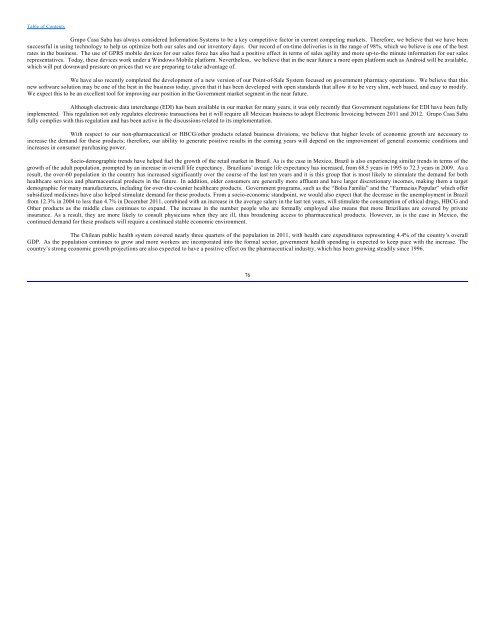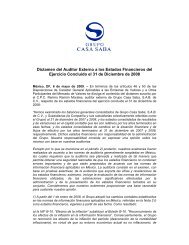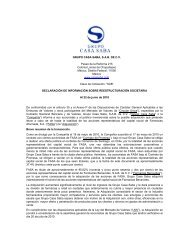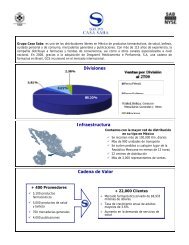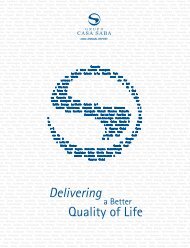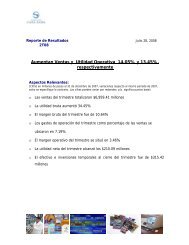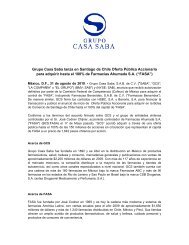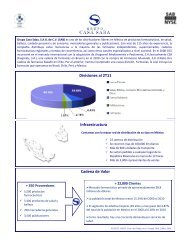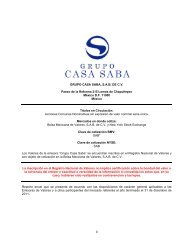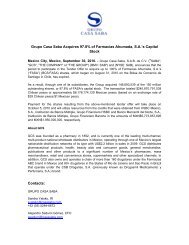FORM 20-F Grupo Casa Saba, S.A.B. de C.V.
FORM 20-F Grupo Casa Saba, S.A.B. de C.V.
FORM 20-F Grupo Casa Saba, S.A.B. de C.V.
You also want an ePaper? Increase the reach of your titles
YUMPU automatically turns print PDFs into web optimized ePapers that Google loves.
Table of Contents<br />
<strong>Grupo</strong> <strong>Casa</strong> <strong>Saba</strong> has always consi<strong>de</strong>red Information Systems to be a key competitive factor in current competing markets. Therefore, we believe that we have been<br />
successful in using technology to help us optimize both our sales and our inventory days. Our record of on-time <strong>de</strong>liveries is in the range of 98%, which we believe is one of the best<br />
rates in the business. The use of GPRS mobile <strong>de</strong>vices for our sales force has also had a positive effect in terms of sales agility and more up-to-the minute information for our sales<br />
representatives. Today, these <strong>de</strong>vices work un<strong>de</strong>r a Windows Mobile platform. Nevertheless, we believe that in the near future a more open platform such as Android will be available,<br />
which will put downward pressure on prices that we are preparing to take advantage of.<br />
We have also recently completed the <strong>de</strong>velopment of a new version of our Point-of-Sale System focused on government pharmacy operations. We believe that this<br />
new software solution may be one of the best in the business today, given that it has been <strong>de</strong>veloped with open standards that allow it to be very slim, web based, and easy to modify.<br />
We expect this to be an excellent tool for improving our position in the Government market segment in the near future.<br />
Although electronic data interchange (EDI) has been available in our market for many years, it was only recently that Government regulations for EDI have been fully<br />
implemented. This regulation not only regulates electronic transactions but it will require all Mexican business to adopt Electronic Invoicing between <strong>20</strong>11 and <strong>20</strong>12. <strong>Grupo</strong> <strong>Casa</strong> <strong>Saba</strong><br />
fully complies with this regulation and has been active in the discussions related to its implementation.<br />
With respect to our non-pharmaceutical or HBCG/other products related business divisions, we believe that higher levels of economic growth are necessary to<br />
increase the <strong>de</strong>mand for these products; therefore, our ability to generate positive results in the coming years will <strong>de</strong>pend on the improvement of general economic conditions and<br />
increases in consumer purchasing power.<br />
Socio-<strong>de</strong>mographic trends have helped fuel the growth of the retail market in Brazil. As is the case in Mexico, Brazil is also experiencing similar trends in terms of the<br />
growth of the adult population, prompted by an increase in overall life expectancy. Brazilians’ average life expectancy has increased, from 68.5 years in 1995 to 72.3 years in <strong>20</strong>09. As a<br />
result, the over-60 population in the country has increased significantly over the course of the last ten years and it is this group that is most likely to stimulate the <strong>de</strong>mand for both<br />
healthcare services and pharmaceutical products in the future. In addition, ol<strong>de</strong>r consumers are generally more affluent and have larger discretionary incomes, making them a target<br />
<strong>de</strong>mographic for many manufacturers, including for over-the-counter healthcare products. Government programs, such as the “Bolsa Familia” and the “Farmacias Popular” which offer<br />
subsidized medicines have also helped stimulate <strong>de</strong>mand for these products. From a socio-economic standpoint, we would also expect that the <strong>de</strong>crease in the unemployment in Brazil<br />
from 12.3% in <strong>20</strong>04 to less than 4.7% in December <strong>20</strong>11, combined with an increase in the average salary in the last ten years, will stimulate the consumption of ethical drugs, HBCG and<br />
Other products as the middle class continues to expand. The increase in the number people who are formally employed also means that more Brazilians are covered by private<br />
insurance. As a result, they are more likely to consult physicians when they are ill, thus broa<strong>de</strong>ning access to pharmaceutical products. However, as is the case in Mexico, the<br />
continued <strong>de</strong>mand for these products will require a continued stable economic environment.<br />
The Chilean public health system covered nearly three quarters of the population in <strong>20</strong>11, with health care expenditures representing 4.4% of the country’s overall<br />
GDP. As the population continues to grow and more workers are incorporated into the formal sector, government health spending is expected to keep pace with the increase. The<br />
country’s strong economic growth projections are also expected to have a positive effect on the pharmaceutical industry, which has been growing steadily since 1996.<br />
76


